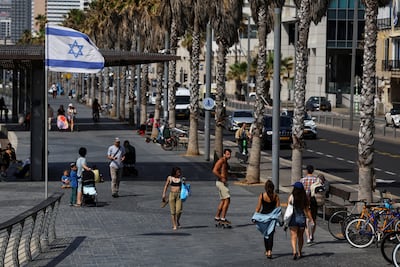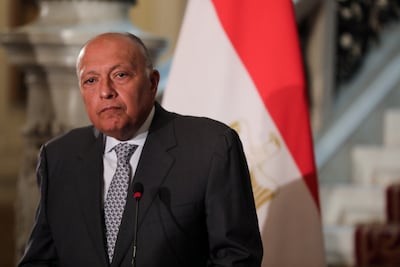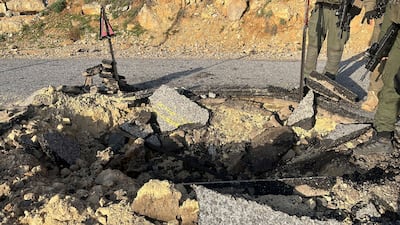Live updates: Follow the latest on Israel-Gaza
Iran’s drone and missile attack on Israel has produced a wave of ridicule among Egyptians on social media – including from pro-government accounts.
This is a rare occurrence in a country where freedom of expression is heavily curtailed, including when it has to do with allies of Cairo, friendly nations or major economic benefactors.
A common thread in many posts is that the Iranian attack and its timing were near common knowledge before it took place overnight on Saturday. However, some observers have said this was because Tehran was primarily concerned with making a gesture.
A further source of amusement was that 99 per cent of the projectiles launched by Iran – more than 300 drones, ballistic and cruise missiles – were intercepted and destroyed, mostly before entering Israeli air space. Some posts were also irreverent towards Iran’s powerful clergy.
“An Iranian strike just to save face!” is how Cairo’s independent daily Al Masry Al Youm on Monday described the mass air raid.
“Man, you have caused so much horror, the whole world is dying of laughter,” a man in a Photoshopped picture is shown in one social media post, sarcastically addressing Iran’s supreme leader Ayatollah Ali Khamenei. “So, you liked my drones, right!?” the Iranian leader responds.
Another post plays on the ineffectiveness of the Iranian projectiles used to attack Israel. It shows a Shiite cleric in a turban and robe flying on a cucumber.
Significantly, some of the social media accounts involved in mocking Iran's attack were pro-government, and likely controlled by authorities or loyalist political parties.

Egypt and Iran have been working for months towards normalising relations to end decades of tension dating back to Iran’s 1979 Islamic revolution. The pair, however, have yet to restore full diplomatic ties, something that sources familiar with Cairo's contacts with Tehran explain as a reflection of a “complex” relationship.
The regional heavyweights pursue contrasting, sometimes clashing, agendas on a wide range of regional issues – including the Palestinian question, relations with the West and groups such as Iranian-backed Hezbollah in Lebanon and militias in Iraq.
Sources close to Egypt's government said Cairo's Al Azhar Mosque, the world's primary seat of Sunni Islam learning, has its reservations about closer relations with Iran. This is mostly out of fear that Tehran would, as it has done elsewhere in the region, embark on Shiite evangelicalism among Egypt's overwhelmingly Sunni population, say the sources.
That Iran did nothing to stop the Houthis – who Tehran backs in Yemen – from attacking Red Sea shipping is another source of friction between Tehran and Cairo, whose vital revenue from the Suez Canal has been badly hit as a result of the attacks.
But despite the widespread derision, Iran’s attack on Israel is of serious concern to Egypt, say analysts. In their opinion, it could shift the world’s focus away from the suffering of Palestinians in Gaza.
More than 33,700 people – mostly women and children – have been killed and another over 76,000 injured in the Israeli bombardment and ground offensive in Gaza. Most of the enclave's 2.3 million population has been displaced and swathes of built-up areas razed, while famine looms in northern parts of the enclave.
Israel launched strikes on Gaza in response to the October 7 Hamas attack on southern Israeli communities, in which about 1,200 people were killed and some 240 abducted.
Crushing Cairo’s hope?
“The attack has moved the focus away from Gaza and instead created the perception of an Israel at risk,” said Michael Hanna, a Middle East expert from the International Crisis Group Brussels-based think tank.
“It might very well end up being seen as a strategic error on Iran’s part. It’s not unreasonable to question the wisdom of Iran’s action.”
Egypt, which borders both Israel and Gaza, has called for “maximum restraint” and warned against widening the Gaza war to engulf the rest of an already volatile region.
“Egypt is in contact with all relevant parties to try to contain the situation and halt its escalation”, the Foreign Ministry said late on Saturday.

On Sunday, Foreign Minister Sameh Shoukry repeated Cairo’s call for restraint in phone calls with his Israeli and Iranian counterparts.
He called on the countries “to exercise utmost self-restraint and refrain from provocations that would increase tension and instability in the region”.
Cairo is ready to intensify its efforts to defuse the current crisis, “which has begun taking a dangerous turn as it coincides with the crisis in the Gaza Strip and adds tension to other hotspots in the region”, the Foreign Ministry said Mr Shoukry told both parties.
Egypt has long viewed a peaceful settlement of the decades-long Palestinian-Israeli conflict as imperative to its own and the region’s security and stability. It saw a silver lining in the Israel-Gaza war which, despite its horrors, has revived the “two-state solution” – the creation of an independent Palestinian state alongside Israel.
Cairo hoped the war in Gaza and the Hamas attack that triggered it would frame Israel’s vulnerability, as well as the dangers of leaving its conflict with the Palestinians unresolved.
It also saw the growing international outcry over the high death toll among Gaza’s civilians and the dire humanitarian situation as additional incentives for world leaders to pressure Israel back to peace negotiations with the Palestinians.

But Iran’s attack, a response to an air strike on its Damascus consulate that killed two generals and five members of Iran's Islamic Revolutionary Guard Corps, may have crushed Cairo’s hopes, said analysts.
It has also restored the decades-old perception of Israel as a victim in a hostile neighbourhood, rather than a nation whose disproportionate response to Hamas’s October 7 attack killed so many civilians that it faces accusations of genocide, they said.
“Egypt wants to separate the Iran-Israel escalation from the Gaza crisis. It views a ceasefire and a prisoner and hostage swap between Israel and Hamas as something that should open a route towards the two-state solution,” said Mohammed Anis Salem, a former Egyptian diplomat who is now a senior member of the Egyptian Council for Foreign Affairs, a Cairo-based think tank.
“Iran needs to de-escalate to avoid detracting from the main issue.”
Egypt, the US and Qatar have for months been trying to broker a ceasefire in Gaza, without success.

